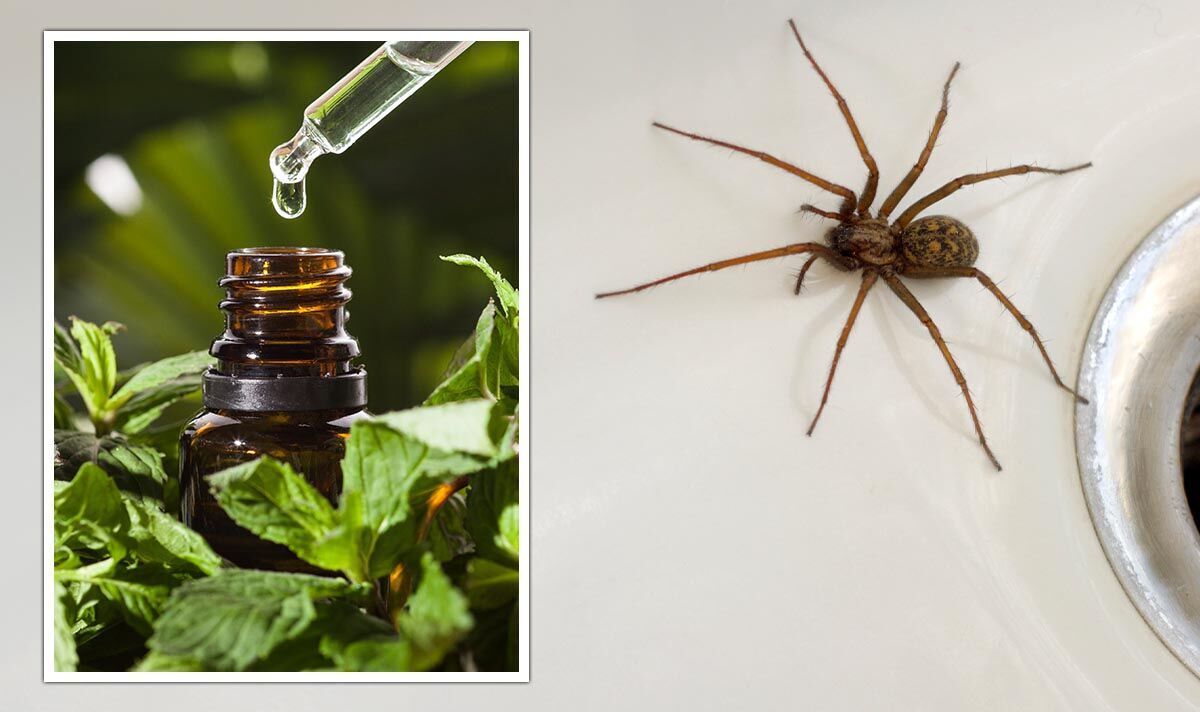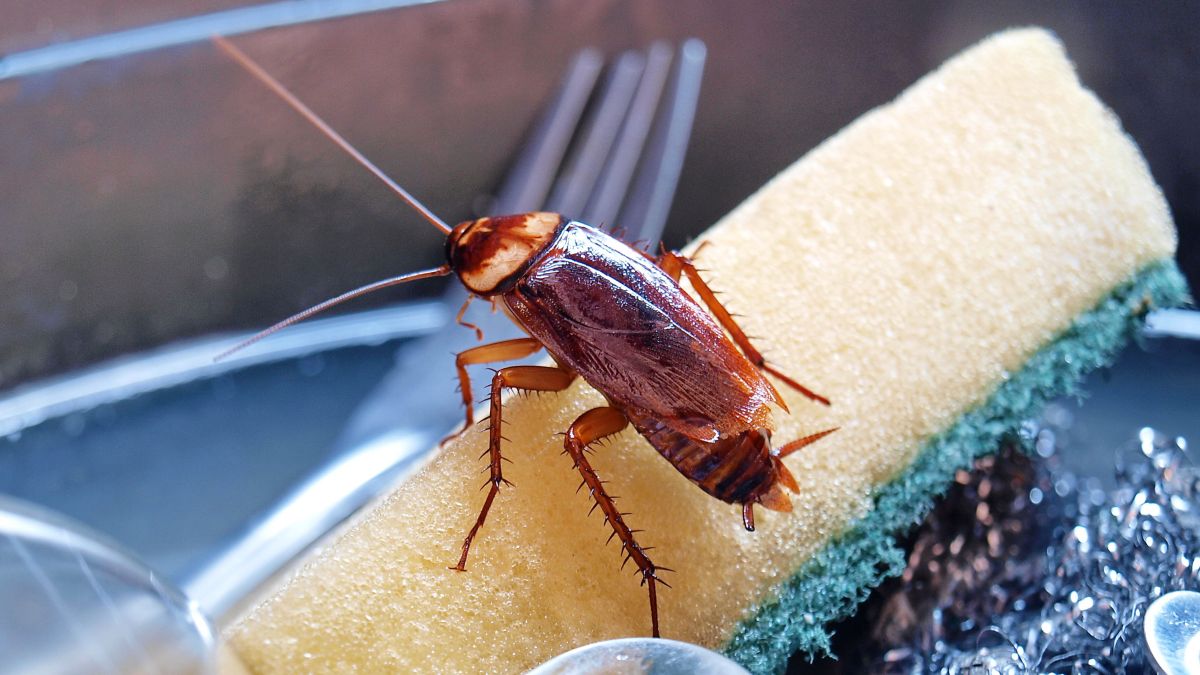Home>Storage Ideas>Kitchen Storage>Natural Spider Repellent—8 Ways To Keep Crawlies Out


Kitchen Storage
Natural Spider Repellent—8 Ways To Keep Crawlies Out
Modified: August 26, 2024
Looking for natural ways to keep spiders out of your home? Check out these 8 kitchen storage ideas that can act as effective spider repellents and keep your space spider-free.
(Many of the links in this article redirect to a specific reviewed product. Your purchase of these products through affiliate links helps to generate commission for Storables.com, at no extra cost. Learn more)
Introduction
Welcome to our guide on natural spider repellents! If you’ve ever had the unsettling experience of finding spiders in your kitchen, you know how important it is to keep these creepy crawlers at bay. While there are various commercial pest control products available, many of them contain harmful chemicals that can be detrimental to your health and the environment. That’s why we’re here to offer you a safer and more natural alternative.
Spiders play an important role in our ecosystem, consuming various pests and insects. However, we understand that you may prefer to keep them out of your kitchen and living spaces. That’s where these natural spider repellents come in handy. Not only are they effective at deterring spiders, but they are also safe to use around your family and pets.
In this article, we will share eight different ways to repel spiders from your kitchen using natural ingredients and substances. These methods are easy to implement and require minimal effort. So let’s dive in and discover how you can keep those eight-legged intruders at bay!
Key Takeaways:
- Keep spiders out of your kitchen with natural repellents like peppermint oil, vinegar, citrus fruits, essential oils, chestnuts, cedarwood, and cinnamon. Maintain a clean space to prevent infestations and enjoy a pest-free environment.
- Embrace natural spider repellents to create a safe, inviting, and spider-free kitchen without harmful chemicals. Experiment with different methods and prioritize cleanliness to keep your kitchen pest-free and enjoyable for cooking and dining.
Peppermint Oil
If you’re looking for a natural and pleasant-smelling spider repellent, look no further than peppermint oil. Spiders are known to dislike the strong scent of peppermint, making it an excellent deterrent in the kitchen. Plus, it adds a refreshing aroma to your living space.
To make a simple peppermint oil spray, fill a spray bottle with water and add around 10-15 drops of pure peppermint oil. Shake well to mix the solution. Spray this mixture around the windowsills, doorways, and other areas where spiders are likely to enter your kitchen. Repeat this process every few days to maintain its effectiveness.
Alternatively, you can soak cotton balls in peppermint oil and place them strategically in areas where spiders tend to gather, such as corners, under cabinets, and near windows. Remember to replace the cotton balls every few weeks or when the scent dissipates.
Not only does peppermint oil repel spiders, but it also helps to deter other insects such as ants and mosquitoes, making it an efficient multi-purpose solution to keep your kitchen bug-free.
Important Note: While peppermint oil is safe for most humans, it is toxic to pets, especially cats. Avoid using peppermint oil in areas accessible to your furry friends, or choose alternative repellents if you have pets.
Vinegar
Vinegar is a versatile household ingredient that can be used as a natural spider repellent in your kitchen. Its strong odor deters spiders, making it an effective and readily available solution.
To create a vinegar spider repellent, simply mix equal parts of distilled white vinegar and water in a spray bottle. Shake well to combine the ingredients. Spray this solution along baseboards, countertops, and other areas where spiders may enter or hide. Repeat this process regularly to maintain its effectiveness.
In addition to repelling spiders, vinegar also acts as a natural disinfectant, helping to keep your kitchen surfaces clean and free from harmful bacteria.
If you’re dealing with spiders in hard-to-reach areas, soak cotton balls or a clean cloth in undiluted vinegar and leave them in those areas. The smell of vinegar will discourage spiders from lingering there.
Furthermore, vinegar can also be used to clean up spider webs. Mix a solution of vinegar and water, dip a cloth or sponge into it, and wipe away any visible spider webs. This will not only remove the webs but also help to erase any pheromone trails left behind by spiders, reducing the likelihood of future infestations.
Important Note: Vinegar should not be used on natural stone surfaces, as it can cause etching or damage. Test the vinegar solution on a small, inconspicuous area before applying it to larger surfaces to ensure compatibility.
Citrus Fruits
Spiders have an aversion to the strong scent of citrus fruits, making them a natural deterrent in your kitchen. The acidic nature of citrus also helps to break down spider webs and discourage spiders from building them.
To utilize citrus fruits as a spider repellent, start by saving the peels from oranges, lemons, or grapefruits. Place these peels strategically in areas where spiders are likely to enter or hide, such as windowsills, doorways, and corners. Replace the peels every few days to maintain their effectiveness.
You can also create a citrus spray by boiling water and adding several citrus peels to the pot. Allow the mixture to simmer for a few minutes, then remove it from the heat and let it cool. Transfer the cooled citrus-infused water into a spray bottle and use it to spray around your kitchen, focusing on areas where spiders are commonly found. The citrus scent will repel spiders and leave your kitchen smelling fresh.
Alternatively, you can use citrus essential oils to achieve the same effect. Add a few drops of lemon, orange, or grapefruit essential oil to a spray bottle filled with water and shake well. Spray this mixture around your kitchen, paying attention to entry points and areas where spiders tend to gather.
Not only are citrus fruits a natural spider repellent, but they also provide a visually appealing and aromatic addition to your kitchen decor. So go ahead and enjoy the vibrant colors and refreshing scents while keeping those eight-legged intruders at bay.
Essential Oils (Lavender, Eucalyptus, Tea Tree)
Essential oils are not only popular for their pleasing aromas but also for their natural insect-repellent properties. Lavender, eucalyptus, and tea tree oils, in particular, are known for their ability to repel spiders.
To create a spider-repellent spray using these essential oils, fill a spray bottle with water and add a few drops of each oil. Shake well to combine the ingredients. Spray this mixture around your kitchen, focusing on entry points, corners, and other areas where spiders may enter or hide.
Lavender oil is known for its calming scent, and its strong odor repels spiders. Eucalyptus oil has a strong, fresh aroma that spiders find unpleasant, effectively deterring them. Tea tree oil not only repels spiders but also has antiseptic properties, making it a great addition to your natural spider repellent arsenal.
Alternatively, you can soak cotton balls in these essential oils and place them in cupboards, corners, and other areas where spiders are likely to hide. The scent will discourage spiders from entering those spaces.
It’s worth mentioning that while essential oils are generally safe for humans, pets, and the environment, some individuals may have sensitivities or allergies. If you or your family members are susceptible to these reactions, it’s best to test a small area with diluted oil or consult a healthcare professional before using them extensively.
By incorporating lavender, eucalyptus, and tea tree oils into your kitchen, you can create a fragrant and spider-free environment, while reaping the additional benefits of their soothing and antiseptic properties.
To keep spiders out, try using essential oils like peppermint, tea tree, or lavender. Spiders dislike the strong scent and will avoid areas where these oils are applied.
Read more: How To Keep Spiders Out Of A Shed
Chestnuts
Did you know that chestnuts can serve as a natural spider repellent? It may come as a surprise, but spiders have a natural aversion to the smell of chestnuts, making them an effective deterrent in your kitchen.
To use chestnuts as a spider repellent, simply scatter some chestnuts around your kitchen, particularly in areas where spiders are often found, such as under cabinets, in corners, or near windows. The aroma released by the chestnuts will help deter spiders from entering your kitchen.
One of the advantages of using chestnuts is that they can remain effective for a long time. You can keep the chestnuts in place until they start to dry out and lose their scent. At that point, simply replace them with fresh chestnuts to maintain their spider-repellent properties.
In addition to being a natural spider deterrent, chestnuts add a rustic and seasonal touch to your kitchen decor. So not only will you keep spiders at bay, but you’ll also enjoy a cozy and inviting atmosphere.
Important Note: While chestnuts are generally safe for humans and pets, it’s crucial to keep them out of reach of small children and animals as they can be a choking hazard if ingested.
By harnessing the natural power of chestnuts, you can create an environment that spiders will want to stay far away from, ensuring a spider-free kitchen.
Cedarwood
When it comes to natural spider repellents, cedarwood is a fantastic option. Cedarwood has long been used to repel pests, including spiders, due to its strong aroma and natural insect-repelling properties.
To utilize cedarwood as a spider deterrent in your kitchen, you have several options. One simple method is to place cedarwood chips or blocks in areas where spiders are likely to enter or hide, such as cupboards, corners, or under sinks. The scent emitted by the cedarwood will naturally repel spiders and discourage them from making your kitchen their home.
If you want a more concentrated approach, you can use cedarwood essential oil. Mix a few drops of cedarwood oil with water in a spray bottle and shake well. Spray this mixture around your kitchen, paying special attention to windowsills, doorways, and other entry points. You can also soak cotton balls in the cedarwood oil and place them strategically around your kitchen to enhance the effectiveness.
Cedarwood not only repels spiders but also has a pleasant and soothing aroma, creating a calming atmosphere in your kitchen. Additionally, cedarwood is a natural moth repellent, helping to keep your kitchen free from pantry pests.
It’s important to note that cedarwood’s effectiveness may diminish over time as the scent fades. In such cases, simply refresh the cedarwood chips, blocks, or essential oil to maintain its spider-repellent properties.
By incorporating cedarwood into your kitchen, you can create an inviting and spider-free environment while enjoying the wonderful scent and additional benefits it provides.
Cinnamon
If you’re looking for a natural spider repellent with a delightful aroma, cinnamon is an excellent choice. Not only does cinnamon add warmth and spice to your favorite dishes, but it can also help keep spiders away from your kitchen.
To use cinnamon as a spider deterrent, sprinkle powdered cinnamon around entry points, corners, and other areas where spiders are likely to enter or hide. You can also create a cinnamon spray by mixing a few drops of cinnamon essential oil with water in a spray bottle and shaking well. Spray this mixture around your kitchen, focusing on spider-prone areas.
Spiders dislike the strong smell of cinnamon, making it an effective natural repellent. Additionally, cinnamon has antimicrobial properties, which can help keep your kitchen clean and free from harmful bacteria.
If you’re dealing with spider webs in your kitchen, sprinkle cinnamon powder directly on the webs. This will not only discourage spiders from rebuilding their webs in that area but will also make them less likely to return.
It’s worth noting that while cinnamon is generally safe for humans and pets, it’s best to use caution and keep it away from the reach of small children and animals, as ingesting large amounts of cinnamon can be harmful.
By harnessing the power of cinnamon, you can create a fragrant and spider-free kitchen, adding a touch of spice and warmth to your culinary haven.
Remove Clutter and Keep a Clean Space
While using natural spider repellents can be helpful, the best way to prevent spiders from invading your kitchen is by practicing good hygiene and keeping a clean and organized space. Spiders are attracted to cluttered and messy areas where they can find hiding spots and a steady food supply.
Here are some tips to keep your kitchen spider-free:
- Declutter: Take the time to declutter your kitchen and remove any unnecessary items. Store kitchen utensils, appliances, and food items in designated areas, keeping counters and surfaces clear.
- Clean regularly: Wipe down countertops, clean spills and crumbs promptly, and sweep or vacuum the floors regularly. By eliminating potential food sources, you’ll make your kitchen less attractive to spiders.
- Seal cracks and crevices: Inspect your kitchen for any gaps, cracks, or holes where spiders could enter. Use caulk or weather stripping to seal these openings, preventing spiders from finding their way indoors.
- Store food properly: Keep all food, including pantry items and fruits, in airtight containers. Spiders are attracted to food sources, so sealing them will deter them from entering your kitchen.
- Keep sinks and drains clean: Spiders can be attracted to moisture. Make sure to clean and dry your sink and drains regularly, as well as fixing any leaky pipes or faucets to reduce moisture build-up.
- Remove spider webs: Regularly check for and remove any spider webs or egg sacs in your kitchen. This prevents spiders from establishing their presence and discourages new ones from moving in.
- Consider natural light: Spiders are attracted to light sources, so consider using curtains or blinds to minimize bright lights in the kitchen in the evenings.
By implementing these practices, you’ll create an environment that is less inviting to spiders. Maintaining a clutter-free and clean kitchen not only helps with spider prevention but also promotes a healthier and more enjoyable cooking experience.
Read more: How To Fix E2 Error In A Washing Machine
Conclusion
Keeping your kitchen free from spiders doesn’t have to involve harsh chemicals or costly pest control methods. By utilizing natural spider repellents, you can create a safe and spider-free environment while maintaining a clean and inviting kitchen.
In this guide, we explored eight different natural spider repellents, including peppermint oil, vinegar, citrus fruits, essential oils, chestnuts, cedarwood, cinnamon, and the importance of decluttering and maintaining a clean space in your kitchen.
Remember that while spiders play an essential role in the ecosystem, it’s understandable to want to keep them out of your kitchen. By incorporating these natural methods, you can enjoy a pest-free environment without compromising the health of your family or the environment.
Experiment and find the repellents that work best for you. Some methods may work better than others depending on the types of spiders in your area and your personal preferences. Feel free to combine multiple methods to maximize effectiveness.
Keep in mind that prevention is key. Regularly maintaining a clean and clutter-free kitchen, sealing entry points, and removing spider webs will go a long way in preventing future infestations.
So, why not try these natural spider repellents and create a kitchen that is both inviting and spider-free? Not only will it provide you with peace of mind, but it will also enhance your cooking and dining experience. Here’s to a happy, healthy, and spider-free kitchen!
Frequently Asked Questions about Natural Spider Repellent—8 Ways To Keep Crawlies Out
Was this page helpful?
At Storables.com, we guarantee accurate and reliable information. Our content, validated by Expert Board Contributors, is crafted following stringent Editorial Policies. We're committed to providing you with well-researched, expert-backed insights for all your informational needs.














0 thoughts on “Natural Spider Repellent—8 Ways To Keep Crawlies Out”